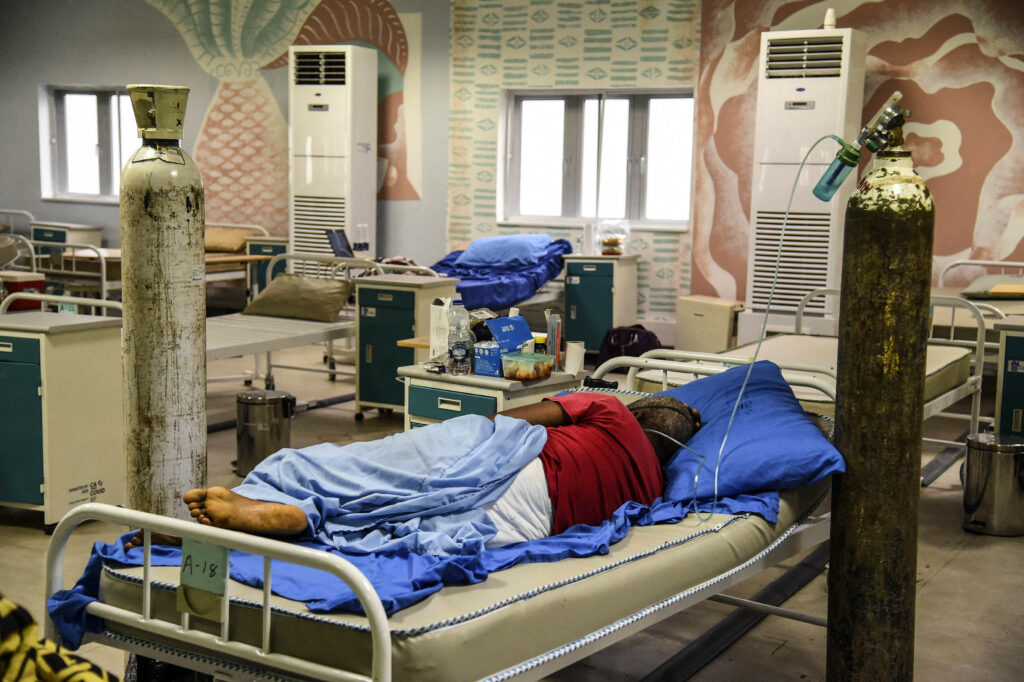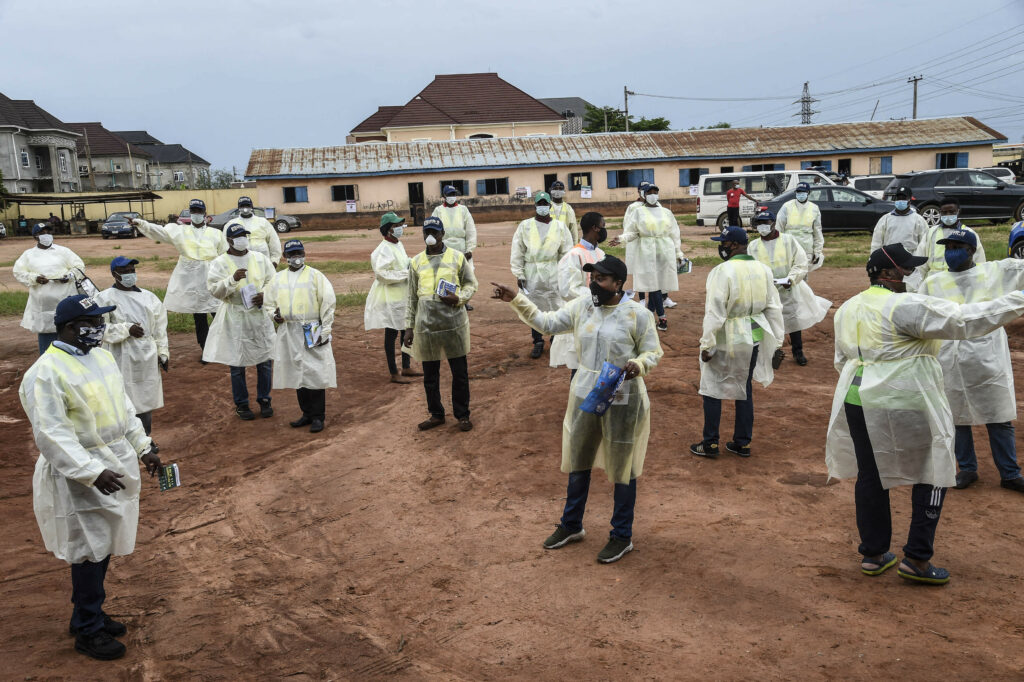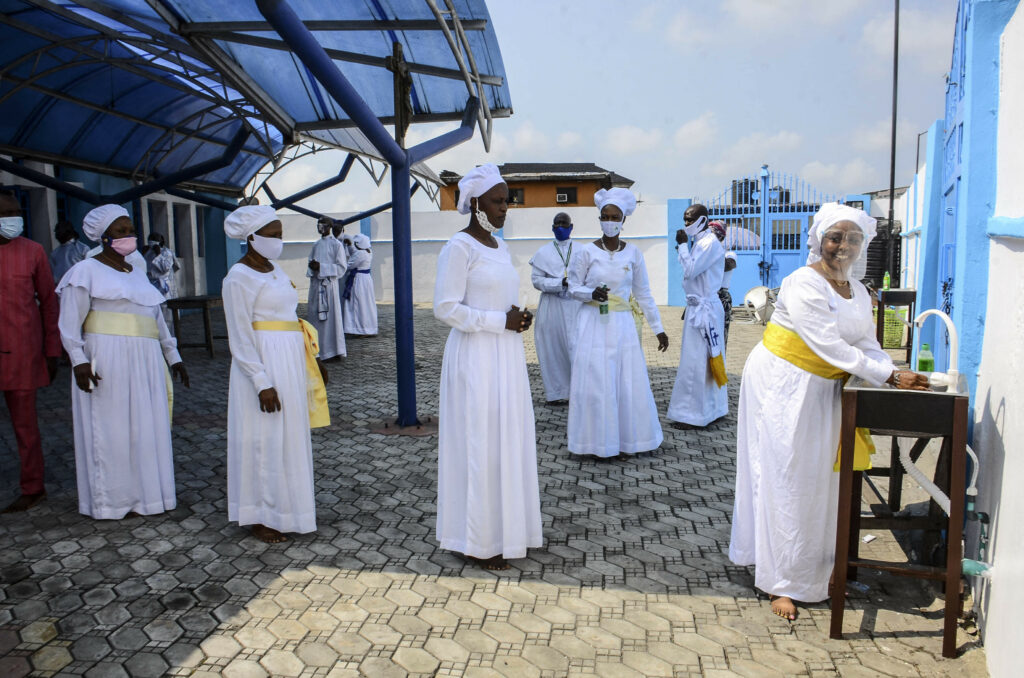Illustration by Oshomah Abubakar
They may have tested negative for Covid-19, but many people are still fighting for their lives.
Adebola* became ill a few days after attending a party in Lagos last March. Her symptoms mirrored what she was beginning to learn about Covid-19, and they continued to escalate, defying the malaria medication she was taking.
“I was feeling very weak. I had diarrhoea. I couldn’t see well. I didn’t know what was happening,” she said in an interview. She started treatment for Covid-19 a few weeks later, but her symptoms worsened. “It was really bad talking,” she recalled. “I would be choking on air; it was like my mouth was forming air bubbles that would trap my words, and I would have to gasp hard for breath.”
About a month after she noticed the first set of symptoms, she recovered, and her symptoms abated. But her recovery was all too brief.
“I started having a different set of symptoms,” the 21-year-old said.
 A Covid-19 patient receives oxygen therapy to treat respiratory challenges at the Lagos State Isolation Centre, in Yaba, Lagos. – The number of confirmed Covid-19 cases in Nigeria is increasing rapidly following daily reports by the Nigeria Centre for Disease Control (NCDC) even as Lagos, Nigeria’s commercial capital, accounted for the highest number of cases in the country. (Photo by PIUS UTOMI EKPEI / AFP)
A Covid-19 patient receives oxygen therapy to treat respiratory challenges at the Lagos State Isolation Centre, in Yaba, Lagos. – The number of confirmed Covid-19 cases in Nigeria is increasing rapidly following daily reports by the Nigeria Centre for Disease Control (NCDC) even as Lagos, Nigeria’s commercial capital, accounted for the highest number of cases in the country. (Photo by PIUS UTOMI EKPEI / AFP)
The Long Haul
Medical experts have termed the constellation of symptoms that manifests in some people after recovering from Covid as Long Covid (or the Covid Long Haul). “It’s an emerging [diagnosis] to describe the persistence of symptoms for patients that initially tested positive for Covid. Now they are negative, but you still see persistence of some of the symptoms for a while,” Dr Tofunmi Omiye, a healthcare researcher, said.
The general understanding about Covid-19 in Nigeria is that the virus causes a mild or debilitating illness, depending on underlying health issues, for a few weeks, after which most patients recover. However, the existence of Long Covid and its varied manifestations in patients complicates this understanding.
Current research into Long Covid in Nigeria makes it difficult to say in specific terms what makes patients susceptible to it and what the numbers of patients are, said Dr Ifeanyi Nsofor, the director of policy and advocacy at Nigeria Health Watch.
The studies on Long Haul from abroad are conflicting. A 2020 study in the British Medical Journal found 10% of patients who have tested positive for Covid-19 remain unwell beyond three weeks, and a smaller proportion much longer. Another study puts that figure at 74%. A survey of 1 655 Covid‑19 patients discharged from a hospital in Wuhan, China and tracked between June and September showed that 76% of them had at least one symptom, such as fatigue, muscle weakness or diminished lung function, after six months.
But post-viral-infection illnesses are not new. Dr Omiye postulates they are due to a number of conditions. Some ensue because of the persistence of inflammatory mediators — chemicals released by the body to fight viruses — even after recovering from the virus. Others are a result of an auto-immune phenomenon where the immune cells created to fight the virus are activated even after recovery and attack the body, while a few others are due to cells not regaining their normal functioning after dealing with the virus.
The symptoms of Long Covid are often varied, but the most common ones are fatigue, shortness of breath, cough, joint pain and chest pain.
Dr John Nkengasong, director of the Africa Centres for Disease Control and Prevention, told the Mail & Guardian the health agency is convening experts across the continent to better understand Long Covid, so they can offer guidance to member states on how to care for patients.
“We’re still gathering the evidence,” Nkengasong said.
“This is a new virus. I’m a biologist of 32 years; I worked on HIV/Aids for 29 years. You thought you knew it, but you never know viruses, how they will impact.”
 The General Manager of the Lagos State Environmental Protection Agency (LASEPA) Dolapo Fasawe addresses staff upon arrival to a formative session for agents training leaders of various unions who are scheduled to train members on measures to curb the spread of Covid-19 coronavirus ahead of the expected gradual easing of the lockdown from next week at Odoguyan in Ikorodu district of Lagos, on April 30, 2020. (Photo by PIUS UTOMI EKPEI / AFP)
The General Manager of the Lagos State Environmental Protection Agency (LASEPA) Dolapo Fasawe addresses staff upon arrival to a formative session for agents training leaders of various unions who are scheduled to train members on measures to curb the spread of Covid-19 coronavirus ahead of the expected gradual easing of the lockdown from next week at Odoguyan in Ikorodu district of Lagos, on April 30, 2020. (Photo by PIUS UTOMI EKPEI / AFP)
‘Post-Covid is worse’
Chioma Ogwuegbu tested positive for Covid-19 in September 2020 and recovered a few weeks later. But like Adebola, her symptoms never left. “There’s been a gamut,” she said. “My quality of life kind of reduced.”
Among the symptoms she feels months after her recovery are fatigue, brain fog, joint aches, flu and body pains. “Sometimes, I would sit in the front of the computer, start typing, and then I just wouldn’t know what I was doing or writing,” she said.
At first, she was confused, worried she had contracted Covid again, but after online searches about her symptoms, came across Long Covid.
For Ogwuegbu, the most painful part of living with the symptoms is the unpredictability. Every morning, she tries to anticipate what illnesses her body will display. Once, she almost collapsed after two online meetings in her living room.
Oreoluwa*, who has been a Long Hauler for a month, has difficulty walking, climbing stairs, standing or sleeping. “At night, I have to use [an ointment] to clear my chest,” she said. “If not, I won’t be able to sleep.”
The “medical gaslighting” that comes with sharing these experiences with Nigerian healthcare professionals often makes it harder to seek medical help. Several doctors told Adebola her long-term symptoms were psychological effects of her recovery from Covid, a product of her imagination and her anxiety. She didn’t buy it.
“Why would I imagine myself having all these things when everybody else is living their lives?” she says.
The consequences of the Long Haul are not just medical. Managing Long Covid comes with financial and emotional costs. Since contracting the virus in January, Oreoluwa’s expenses have increased. She, like other Long Haulers, has to pay for Covid tests, medical tests, regular medication, immune boosters, doctor visits and home-based services to make her life a little less stressful.
“I had to, for December and November, reduce my workload drastically. I had to not take on some jobs,” said Ogwuegbu, who runs a research consulting firm from home.
Oreoluwa can no longer hang out with friends; her productivity has dropped and her workplace isn’t supportive. “I don’t think they have any plan for my Long Covid case. I don’t think they are even interested in welfare and recovery.”
The toll for Adebola has also been emotional: her boyfriend broke up with her last year during her ordeal with Long Covid. “He got tired of me,” she said.
Long Hauling community
To manage the condition, many Long Haulers have turned to themselves, setting up or joining online support groups. Ogwuegbu joined a Facebook group of thousands of mostly American Long Haulers. But she was frustrated by the cultural divide between her experiences in Nigeria and those in America, so she formed a group for Nigerians whom she’d met through her tweets about her condition.
On these groups, Long Haulers share symptoms, provide support and answer questions. “Research has backed support groups being very helpful for patients dealing with not just acute illnesses, but long-term illnesses,” Dr Omiye said. “Sharing their experiences about these things, we know, improves outcomes for patients. People in support groups usually fare better.”
But Long Haulers who don’t know about these online communities or have access to them have to deal with their issues alone. To cope with depressive episodes, Oreoluwa’s friend recommended that she begin therapy. However, it hasn’t been sufficient.
“I talk to my therapist,” she said, “but it’s not like when you’re in a community of people that you have similar traits and realities with.”
 Women take turns to wash their hands as worship centers reopen after the Covid-19 lockdown, at the entrance of Celesitail Church of Christ, Arch Diocese National Headquarter Makoko, Lagos, as measures against the spread of Covid-19 Coronavirus in Lagos, Nigeria. (Photo by Olukayode Jaiyeola/NurPhoto) (Photo by Olukayode Jaiyeola / NurPhoto / NurPhoto via AFP)
Women take turns to wash their hands as worship centers reopen after the Covid-19 lockdown, at the entrance of Celesitail Church of Christ, Arch Diocese National Headquarter Makoko, Lagos, as measures against the spread of Covid-19 Coronavirus in Lagos, Nigeria. (Photo by Olukayode Jaiyeola/NurPhoto) (Photo by Olukayode Jaiyeola / NurPhoto / NurPhoto via AFP)
The way forward
The existence of Long Covid challenges the understanding of the definition of recovery from Covid-19, but Dr Omiye argues that adjusting the language of recovery might have dire consequences on the allocation of funds. “Covid Long Haul would better be appropriated as a burden, while we continue to see recovery as people who have [simply] tested negative,” he said.
The lack of a coordinated national policy for understanding and managing Long Covid could cause a public health crisis. It also prevents health workers from being prepared to care for patients or educate Covid patients about the possible long-term effects they might experience.
Dr Oluwasegun Afolaranmi, a physician at St Nicholas Hospital in Lagos, argues it is important to develop a localised response to Long Covid. “For all we know, the percentage of Long Haulers may be more or lower in our environment,” he said. “We don’t know whether the kind of treatment they would need would be quite different from other parts of the world, so it is important that we conduct our own research and generate evidence that will guide our own management and prevention.”
Dr Nsofor believes in innovative healthcare advocacy that involves educating influential community leaders — religious leaders, leaders of political organisations and leaders of pressure groups. “People are tired of hearing from [healthcare professionals] all the time,” he says. “Let’s get people that they respect and revere [to] be the mouthpiece for advocacy.”
Having lived with the after-effects of Covid for almost a year now, Adebola is familiar with the patterns the illness takes. Although she’s terrified she might deal with this for longer, she’s also optimistic about her recovery. “Maybe we’ll eventually get a Long Covid clinic here, like in other countries,” she says. “Hopefully I won’t be sick by then.”
*Name changed to protect their identity